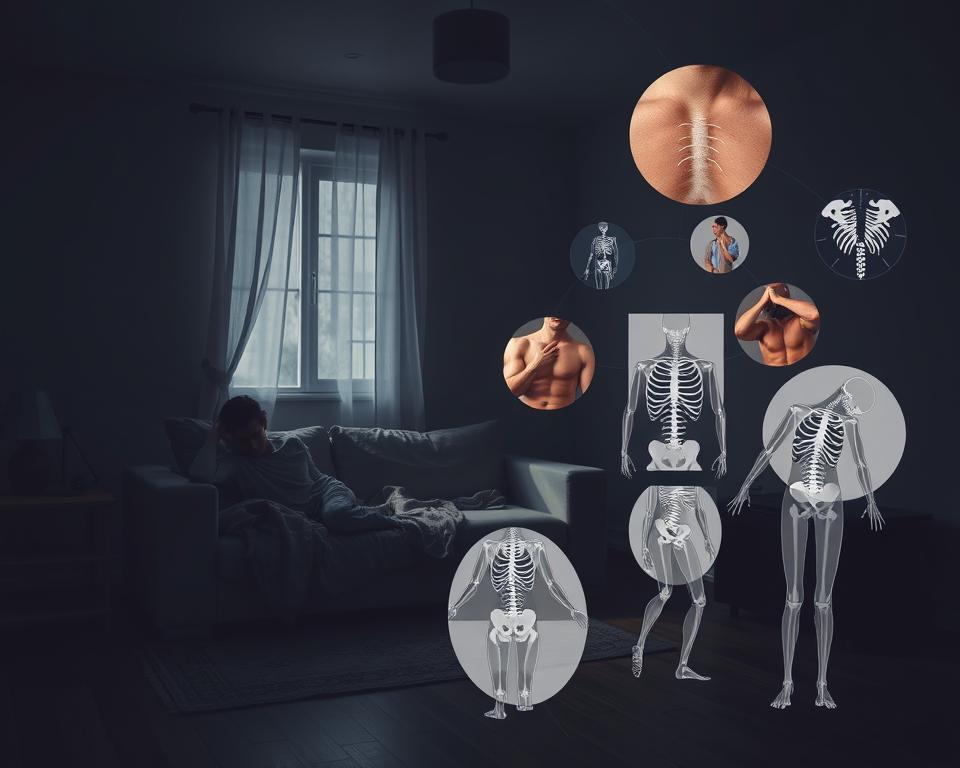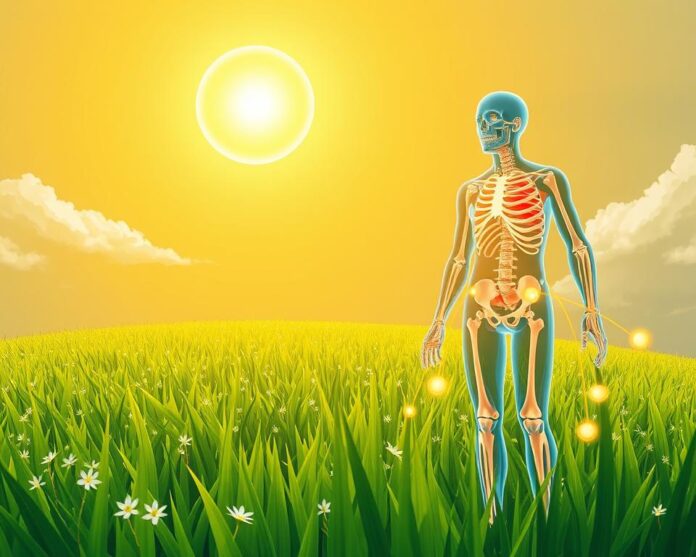Vitamin D is called the “sunshine vitamin” because it’s vital for our health. This guide will cover everything you need to know about Vitamin D. We’ll talk about its role in keeping our bones strong, boosting our immune system, and improving our mood and energy.
We’ll look at the latest studies and advice from experts. This will help you understand how to get enough Vitamin D and deal with any shortages. By the end, you’ll know how to make the most of this important nutrient.
Key Takeaways
- Vitamin D is essential for bone health, calcium absorption, and immune system function.
- Vitamin D deficiency can lead to a range of health issues, including fatigue, mood disorders, and hair loss.
- Optimal Vitamin D levels can be achieved through a combination of sun exposure, dietary sources, and supplementation.
- Vitamin D works synergistically with Vitamin K2 to provide additional benefits for overall health.
- Proper Vitamin D supplementation and monitoring are crucial to prevent potential overdose or toxicity.
Understanding Vitamin D: Essential Functions and Benefits
Vitamin D is a key nutrient for our health and well-being. It helps with bone health and mood regulation. It’s vital for our overall health.
Role in Bone Health and Calcium Absorption
Vitamin D helps our body absorb calcium, which is crucial for strong bones. It ensures our bones stay healthy by helping calcium get into our bloodstream. This reduces the risk of osteoporosis and fractures.
Impact on Immune System Function
Vitamin D is also important for our immune system. It helps our body fight off infections and illnesses. Having enough vitamin D can lower the risk of autoimmune diseases and keep our immune system strong.
Mental Health and Mood Regulation
Vitamin D also affects our mental health and mood. Not having enough can lead to depression and anxiety. It helps our brain produce neurotransmitters, which can improve our mood and overall happiness.
In summary, vitamin D is essential for many health benefits. It supports bone health and calcium absorption, boosts immune system function, and helps with mood regulation. Knowing how vitamin D works can help us make better health choices.

“Vitamin D is a unique nutrient that plays a crucial role in maintaining our physical and mental health. Its benefits extend far beyond just bone health.”
Signs and Symptoms of Vitamin D Deficiency
It’s important to know the signs of vitamin D deficiency early. Vitamin D is key for our health. Not having enough can harm our body and mood.
Fatigue and muscle weakness are common signs. People with low vitamin D feel tired and weak. This makes everyday tasks hard.
Bone pain and weakening are also signs. Vitamin D helps our bones absorb calcium. Without it, bones can ache and break more easily.
Vitamin D also affects our mood. Low levels can lead to depression and anxiety. People might feel sad or have trouble focusing.
To sum up, symptoms of vitamin D deficiency include:
- Fatigue and muscle weakness
- Bone pain and increased risk of fractures
- Mood changes, including depression and anxiety
- Weakened immune system
- Increased risk of chronic diseases
Not everyone shows symptoms. But regular check-ups and blood tests can spot vitamin D deficiency. This helps start treatment.

“Vitamin D deficiency is a silent epidemic, with far-reaching consequences for health and well-being.”
Natural Sources of Vitamin D: Sunlight and Diet
Vitamin D is crucial for our health. We can get it from sunlight and some foods. Knowing how to use these sources is important for keeping our vitamin D levels right.
Optimal Sun Exposure Guidelines
The sun is a main source of vitamin D. Experts say to expose bare skin to the sun for 10-30 minutes, 2-3 times a week. This should be during the midday hours. But, where you live, your skin color, and the season can change how much vitamin D you make.
Top Vitamin D-Rich Foods
- Fatty fish like salmon, tuna, and mackerel
- Egg yolks
- Fortified dairy products like milk and yogurt
- Mushrooms exposed to UV light
- Cod liver oil
Seasonal Variations in Vitamin D Production
Vitamin D making changes with the seasons and where you live. In winter or at higher latitudes, the sun’s rays might not be strong enough. Eating more vitamin D-rich foods can help during these times.
“Vitamin D deficiency is a global public health problem, with an estimated 1 billion people worldwide having insufficient levels.”
By knowing about vitamin D sources and how to get more, you can keep your levels healthy all year.
The Connection Between Vitamin D and Mental Health
Vitamin D, known as the “sunshine vitamin,” is crucial for both our physical and mental health. Research has found a strong link between Vitamin D levels and mental health. This includes depression, mood, and brain function.
Studies show that a lack of Vitamin D is linked to a higher risk of depression. People with low Vitamin D levels often feel sad, lose interest, and feel hopeless. On the other hand, enough Vitamin D can improve mood and lower depression risk.
Vitamin D does more than just help our mood. It also boosts brain function and may lower the risk of dementia and Alzheimer’s. Vitamin D receptors are found in the brain, showing its role in brain health.
“Vitamin D is truly a multifaceted nutrient that can have a profound impact on our mental well-being. Ensuring we maintain healthy Vitamin D levels is an important step in supporting our overall mental health and resilience.”
To get more Vitamin D, eat foods rich in it like fatty fish, egg yolks, and fortified dairy. Also, spending time in the sun helps your body make Vitamin D. Keeping Vitamin D levels balanced is vital for a good mood, brain function, and mental health.
How Vitamin D Impacts Hair Health and Growth
Did you know vitamin D is key for healthy hair? Vitamin D deficiency can lead to hair loss and other hair problems. Knowing how vitamin D affects hair health is the first step to solving hair issues.
Understanding Hair Loss and Vitamin D Deficiency
Hair follicles need enough vitamin D to work right. Vitamin D deficiency can mess up the hair growth cycle, causing more hair shedding and thinning. This is because vitamin D helps control the hair follicle’s growth phase.
Treatment Options for Hair-Related Issues
If you think vitamin D deficiency is causing your hair loss or hair problems, there are ways to help:
- Increase sun exposure to boost natural vitamin D production
- Eat foods rich in vitamin D, like fatty fish, egg yolks, and fortified dairy
- Take a high-quality vitamin D supplement, but talk to your doctor first
- Deal with any health issues that might be causing hair loss, like thyroid problems or autoimmune diseases
By fixing vitamin D deficiency, you might see better hair health and growth. Always talk to a healthcare expert for advice and treatment plans.
“Maintaining adequate vitamin D levels is essential for healthy hair growth and preventing hair loss.”
Vitamin D Supplementation: Types and Dosage
Choosing the right vitamin D supplement can be tough. Knowing the different types and how much to take can help. This way, you can pick what’s best for you.
Vitamin D Supplement Forms
Vitamin D supplements come in two main forms: D2 and D3. D3 is often seen as more effective and easier for the body to absorb.
- Vitamin D2: Made from plants, like mushrooms or yeast.
- Vitamin D3: Comes from animals, such as fish oil or sheep’s wool.
Recommended Vitamin D Dosage
The amount of vitamin D you need changes with age and health. Here are some general guidelines:
- Adults: 600-800 IU (15-20 mcg) daily
- Children and adolescents: 600 IU (15 mcg) daily
- Older adults: 800-1,000 IU (20-25 mcg) daily
Remember, these are just general suggestions. Your needs might be different. Always talk to your doctor about the right vitamin D supplement and dosage for you.
“Maintaining adequate vitamin D levels is crucial for overall health and well-being.”
When picking a vitamin D supplement, choose high-quality ones. Look for products that have been tested by third parties. This ensures you get the best vitamin D supplements for your needs.
The Synergistic Effects of Vitamin D and K2
Vitamin D and vitamin K2 are two nutrients that work together for better health. Vitamin D is known for its role in bones and the immune system. But, the benefits of vitamin D and K2 together are often missed.
Benefits of Combining These Nutrients
Vitamin D and K2 together are a powerful team. Vitamin D helps the body use calcium, and K2 directs calcium to bones and teeth, not arteries. This duo helps keep bones strong and lowers heart disease risk.
They also support the immune system, brain health, and hair growth. Using these nutrients well can bring many health benefits.
Recommended Dosage Combinations
Experts say to take vitamin D and K2 together for best health. A good dose is 5,000-10,000 IU of vitamin D and 100-200 mcg of K2 daily. Remember, everyone’s needs are different. Always talk to a doctor before starting new supplements.
“The synergistic effects of vitamin D and K2 are truly remarkable. By taking these nutrients together, individuals can unlock a whole new level of health and well-being.”
Adding vitamin D and K2 to your daily routine can boost your health. Knowing how these nutrients work together helps you make better choices for your health.
Sexual Health and Vitamin D Levels
Vitamin D, known as the “sunshine vitamin,” is key for health. It’s also important for sexual well-being. Research shows that the right amount of vitamin D can boost sex drive in both men and women.
Studies link vitamin D and sexual health closely. It helps control hormone levels, like testosterone, which is vital for sex. Vitamin D also improves fertility by making sperm and eggs better.
Vitamin D also boosts energy levels for sex. Feeling tired can lower sex drive and performance. Healthy vitamin D levels can increase energy and sex satisfaction.
“Vitamin D is essential for sexual health, as it helps regulate the production of hormones and can improve fertility in both men and women.”
To keep vitamin D and sexual health in check, get enough vitamin D from sun, food, and supplements. Fixing vitamin D gaps can lead to better sex life and intimacy.
In summary, the link between vitamin D and sexual health is getting more attention. Keeping vitamin D levels right can make sex more enjoyable. Knowing this can help people improve their sex life and overall health.
Preventing and Treating Vitamin D Overdose
Vitamin D is vital for our health, but too much can be harmful. Taking too much vitamin D can cause hypercalcemia, a serious condition. We’ll look at the signs of too much vitamin D and how to safely take supplements.
Signs of Hypercalcemia
The main sign of vitamin D overdose is high calcium levels in the blood, known as hypercalcemia. Common symptoms include:
- Nausea and vomiting
- Fatigue and weakness
- Frequent urination and increased thirst
- Constipation or abdominal pain
- Muscle and bone pain
- Confusion, memory loss, and difficulty concentrating
Safe Upper Limits and Monitoring
The safe upper limit for vitamin D supplementation is 4,000 IU per day for adults. But, everyone’s needs are different. It’s best to talk to a doctor to find the right dose and check vitamin D levels often.
Getting regular blood tests for calcium levels can spot hypercalcemia from vitamin D overdose early. If calcium levels are too high, stop taking vitamin D right away. Then, see a doctor to handle the risks of vitamin D overdose and hypercalcemia.
“Moderation is key when it comes to vitamin D supplementation. It’s important to strike the right balance to maintain optimal health without risking the dangers of hypercalcemia.”
Vitamin D and Energy Levels: Breaking the Fatigue Cycle
Feeling tired all the time can be really tough. But, there might be a simple fix: vitamin D. This vitamin is key for keeping your energy up and fighting off fatigue.
Many studies link vitamin D and energy boost together. Vitamin D helps your body make energy by supporting your cells’ powerhouses. When you don’t have enough vitamin D, your cells don’t work as well, making you feel more tired.
“Vitamin D deficiency is often overlooked as a potential cause of fatigue and low energy levels. By addressing this deficiency, many individuals have reported a significant improvement in their daily energy and well-being.”
If you’re always tired and cold, vitamin D might be the answer. Eating foods rich in vitamin D or taking a supplement could change everything. It could help you feel more energetic and break the cycle of fatigue.
To boost your energy with vitamin D, you need to fix any deficiency. Keeping your vitamin D levels right can make you feel more energetic, happier, and healthier. Let vitamin D help you overcome fatigue and live a more vibrant life.
Special Considerations for Vitamin D Supplementation
When thinking about Vitamin D supplements, there are key points to remember. Vitamin D can help with weight management. Studies show that having enough Vitamin D can aid in losing weight.
It’s important to stick to the daily Vitamin D intake guidelines. Taking too much can cause side effects like too much calcium in the blood. Doctors usually recommend 600-800 IU of Vitamin D per day for adults. Some people might need up to 4,000 IU, but only under a doctor’s watch.
Vitamin D needs can change based on your age and health. Older people, those who don’t get much sun, and folks with certain health issues might need more Vitamin D. Always talk to your doctor to figure out the right amount for you.
FAQ
What are the essential functions and benefits of Vitamin D?
Vitamin D is key for strong bones and absorbing calcium. It also boosts the immune system and helps with mood and mental health.
What are the common symptoms of Vitamin D deficiency?
Signs of Vitamin D deficiency include feeling tired, bone pain, and muscle weakness. Mood swings can also happen.
How can I get Vitamin D from natural sources?
Getting Vitamin D naturally involves spending time in the sun. You can also eat foods like fatty fish, egg yolks, and fortified dairy products.
How does Vitamin D impact mental health and mood?
Vitamin D helps control mood. Research shows a link between low Vitamin D and depression and other mental health issues.
Can Vitamin D deficiency cause hair loss?
Yes, not having enough Vitamin D can lead to hair loss. Fixing this deficiency may help your hair grow back.
What are the different types of Vitamin D supplements?
Vitamin D supplements come in two main types: D3 (cholecalciferol) and D2 (ergocalciferol). The right amount depends on your age and needs.
What are the benefits of taking Vitamin D and Vitamin K2 together?
Vitamin D and Vitamin K2 work together well. They support bones, heart health, and overall well-being. Taking them together can offer more benefits.
How does Vitamin D affect sexual health?
Having enough Vitamin D is linked to better libido, fertility, and sex life in both men and women.
What are the risks of Vitamin D overdose?
Too much Vitamin D can cause high calcium levels in the blood, known as hypercalcemia. Always follow the recommended dose and check your levels.
Can Vitamin D help boost energy levels and combat fatigue?
Yes, fixing Vitamin D deficiency can increase energy, fight fatigue, and improve daily life and well-being.
Are there any special considerations for Vitamin D supplementation?
Age, health, and weight goals can affect Vitamin D needs. Always talk to a doctor to find the right dose and check levels regularly.



























